
Teen self-identity forms the basis of self-esteem. Here’s how and why.
Identity for teens refers to their sense of self as individuals and how they define themselves in terms of values, beliefs and their roles in the world. For teens, thinking about their identity is a new first-time exploration. They are starting to wonder who they are and why. In other words they are developing a perception of themselves.
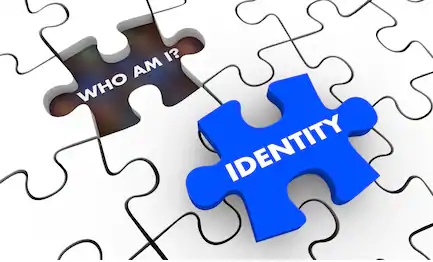
A positive teen self-identity becomes vital as it forms the basis of self esteem and it also shapes a teen’s sense of belonging not just during their teen years but for most of their adult life. A feeling that one belongs is most important in feeling valued in life. A failure to establish identity in adolescence leads to role confusion and a weak sense of self later in life.
Teenage years is also the time when major bodily changes occur along with hormonal changes. Also, in these years, the way we see ourselves changes in response to peers, family & school, among other social environments. Some teens are able to learn to discover their identity in a healthy and age-appropriate way. However, some teens experience lack of identity and face identity crisis, where they struggle with feelings of self-doubt and unworthiness..in other words it is called identity versus role confusion. This could be due to big changes or stressors in life.
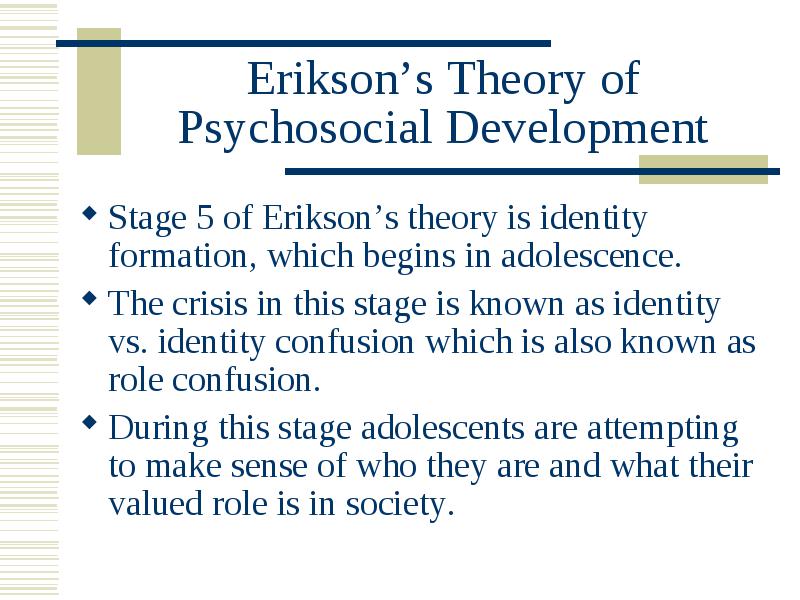
As a way to navigate stress and confusion that comes with identity development, some teens turn to outside influences to help them define their identity. Some common ways could be idolizing/identifying with a famous person or engaging in addictive behaviours like smoking, drinking, drugs and other thrill seeking activities. Sometimes these risky behaviours could potentially have a negative and lasting effect on their lives.
The teenage years are a volatile phase during which moods, behaviours and relationships can change every day. This is the time when teens most struggle with low self-esteem. Parents are often stressed and overwhelmed and may not know how to help them.
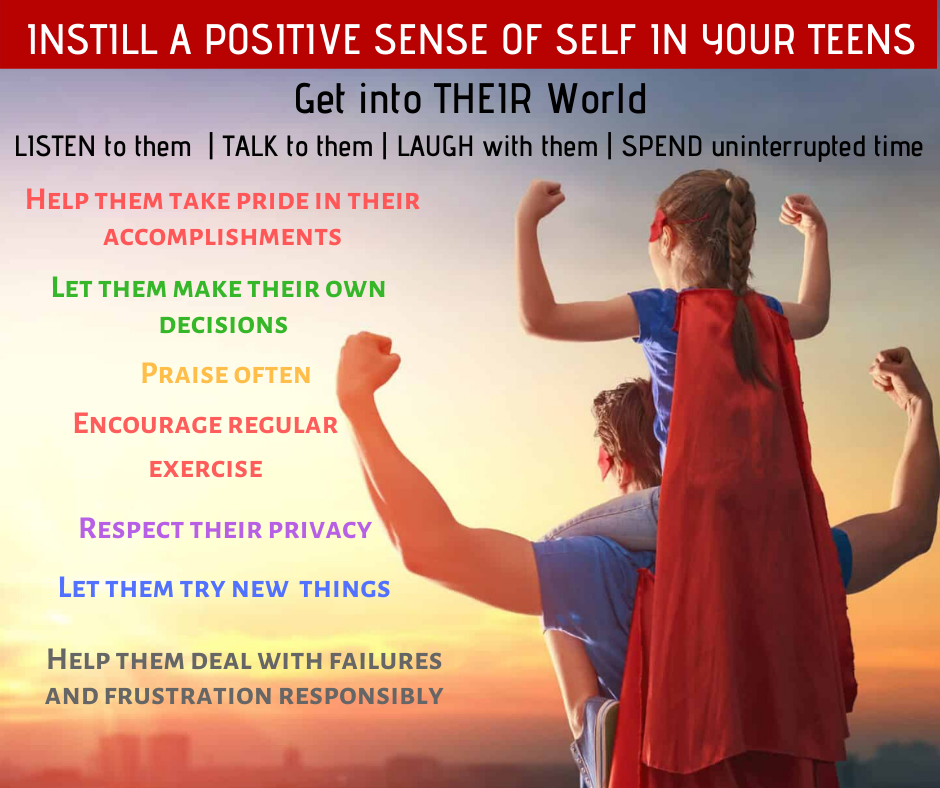
According to researcher Susan Harter,SELF-CONCEPT is domain specific. Over all self esteem is rooted in 8 distinct areas.
1.Athletic Competance
2.Scholastic Competance
3.Behavioral Conduct
4.Social Acceptance
5.Close Friendship
6.Romantic Appeal
7.Job satisfaction
8.Physical Attractiveness
Based on this, here are ways parents can influence how adolescents think about themselves by instilling a positive sense of self in them.
1.Encourage physical exercise: Teen self-concept is most strongly linked to their sense of physical attractiveness and body image. Engaging in exercise helps them get in touch with their body and makes them feel more empowered.
2.Support them by emphasizing their strengths: Depending on their personal values and priorities, adolescents can be helped to identify with their talents and interests, so that they can capitalize on specific skills.
3.Avoid social comparision: Teens sense an “imaginary audience”(everyone is looking at me).They are highly sensitized to who they are, relative to everyone around them.Also, peer opinion is of utmost importance for them. It goes a long way in boosting them if parents understand and respect this.
4.Helping them focus on SELF-COMPASSION: When teens are taught to be okay with their flaws and treat self with kindness, openness and acceptance, they learn to love and appreciate themselves.This is key because ‘making friends with themselves’ would help them extend the same kindness to others which would strengthen their friendships.
5.Help them to think beyond themselves too: When adolescents are encouraged to help others especially strangers or when they contribute to a larger cause, they feel better about themselves.
6.Some other ways to help them feel better about themselves would be to appreciate them often, encouraging them to develop a positive approach for establishing boundaries and consequences ,viewing mistakes as learning opportunities, teaching them to accept things about themselves that they cannot change and lastly, helping them to set practical and realistic goals and accomplish them.
Sometimes parents are stressed and overwhelmed and may not know how to help them.
Often times, as a parent you may need to seek professional counseling for your teen to address behavioural problems, emotional issues, substance abuse, self harm and risky sexual behaviours.
A trained professional can assess the issues and help your teen help themselves.
Unleash Possibilities is your space to be open, honest and get support.
To know more, reach out to us at
+91 9019008494
Mondays to Saturdays 9 am to 7 pm
Learn More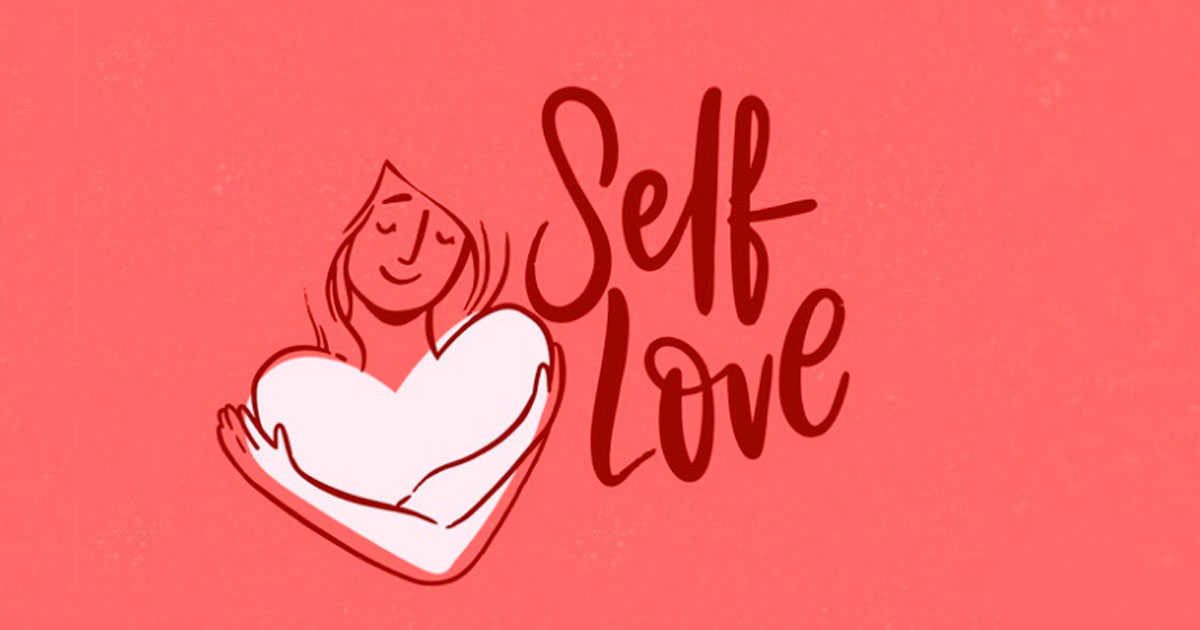
Everything you need to know about Self-Love.

Self-love means taking care of your own needs and not sacrificing your own well-being and happiness to please others.
Self-love means not settling for less than you deserve.
Self-love is a practice.
Self-love is a skill.
…….. and it takes work.
The practice of self love is the practice of nourishing yourself.
Self-love is simply being aware of how you are feeling and what makes you feel better.
Before you can receive love and respect from others, you need to love and respect yourself. Self-love is important to living well. It influences who you pick for a mate, the image you project at work and most importantly how you cope with the problems in your life.
When we act in ways that expand self-love in us, we begin to accept better our weaknesses as well as our strengths, have less need to explain our shortcomings, have compassion for ourselves as human beings.
Self-love determines your happiness. It motivates you to make healthy choices in life. When you hold yourself in high esteem, you are more likely to choose things that nurture your well-being.
When you love yourself, you become the highest version of yourself and it feels natural to take good care of your body, mind and soul.
On the other hand, when you make decisions out of a need to please, or to avoid conflict or out of guilt, you over value the needs of others and often disrespect yourself. Then it becomes hard to take care of yourself. You need to put extra effort or train yourself to practise self- love.
The first step towards self-love is self-awareness, becoming mindful about what you think, what you feel and what you want.
Unleash Possibilities helps you take that first step by helping you with activities and exercises to train your mind towards self-love. These may include positive self-talk, positive affirmations, good self-care, forgiving yourself, setting boundaries, self-acceptance, self-awareness and most of all LIVING INTENTIONALLY WITH A SENSE OF PURPOSE IN LIFE.
To know more about us, contact at +91 9019008494
Learn More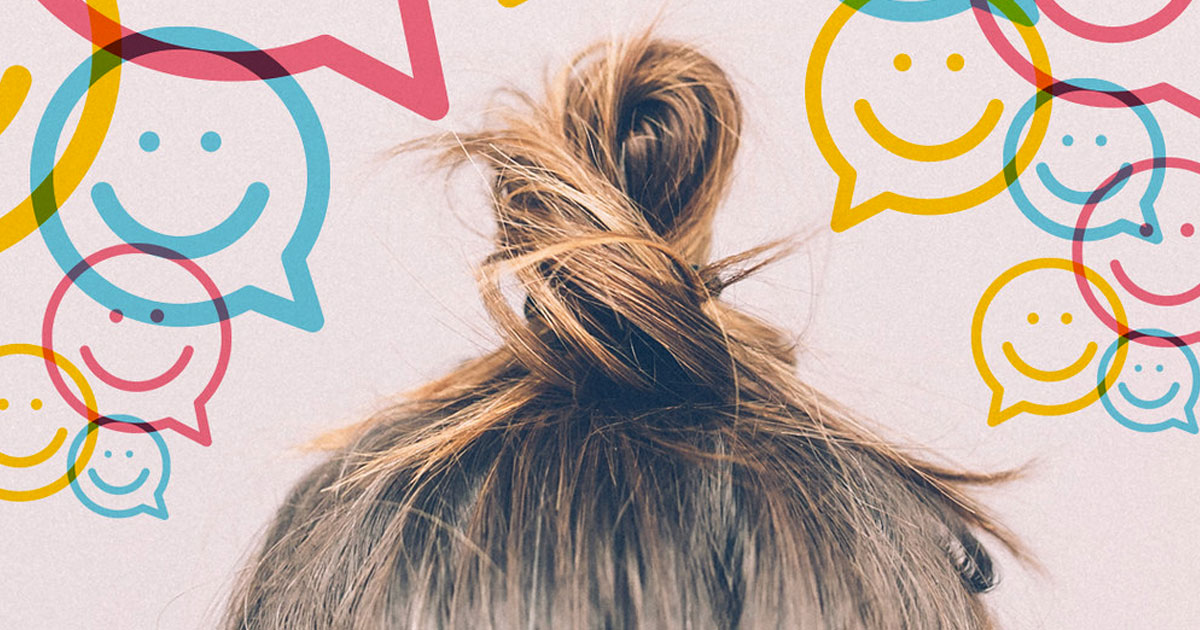
Your inner world creates your outer world:An Insight

Thoughts pass through the mind all the time. On average each one of us have 70,000 thoughts per day.
Your thoughts determine the way you see yourself and the world around you.
A belief system is a thought you have thought over and over again. The beliefs you have about anything in your life are created over a period of time through a consistent way of thinking.
What you think directly influences how you feel and how you behave.
Your beliefs about who and what you are and what you are capable of, in turn greatly impact your thoughts, words, self-image, actions and results in life.
Thought patterns, whether positive or negative, become a habitual way of thinking and are so ingrained, we are often unaware of them. They become our belief systems.
The way you think about yourself turns into reality. You need to be extremely careful what kind of self-talk you are doing. Everyone has negative thoughts, the problems come when we believe our thoughts are true. How positive our lives are is determined by how we deal with those negative thoughts. You can ignore them, accept them as truth or you can confront them head on. For example, to constantly criticise yourself because you think you are not good enough is one of the patterns of negative thinking. Every time you talk yourself down, doubt yourself, exhaust yourself, dismiss your feelings or needs, you undermine your self esteem and may develop a faulty belief of yourself and your capabilities.
Self-defeating thoughts are any negative views you hold about yourself and the world around you. Also known as mistaken or faulty beliefs, these views impact your self-esteem, the feelings you carry about your personal abilities, and your relationships with others. They limit your potential.
When faced with setbacks or obstacles, negative thinking may cause you to over analyze or exaggerate the severity of a situation. Over a period of time they develop into a faulty belief system. Negative thoughts and faulty beliefs can negatively impact your feelings, emotions and mental health. They may develop into mood and anxiety disorders, panic disorder and depression.

Yes.…..The sky is not the limit. Your belief system is. The world we see is the result of a belief system. When you label something, anything you say-this is the way it is and the only way it can be, it limitings your own understanding. To perceive the world differently, we must be willing to change our belief systems.
However, the good news is there are ways to break the cycle of self-defeating beliefs and negative thinking patterns.
At Unleash Possibilities we believe that endless possibilities exist just beyond your belief system. We help you get in touch with your thoughts, feelings and belief systems so that you can unleash your hidden true potential. We help you unlearn or change your negative thoughts to more nurturing, empowering and encouraging ways to viewing your life.
Our counselors are well equipped with tools like Cognitive Behavioral Therapy or CBT , which are modelled on the idea that our thoughts and belief systems contribute to our mental health . CBT aims to shift these negative thinking patterns.
To know more, contact us at +91 9019008494

